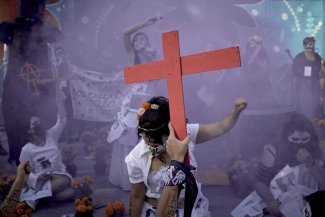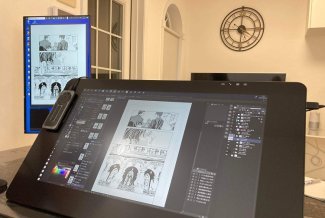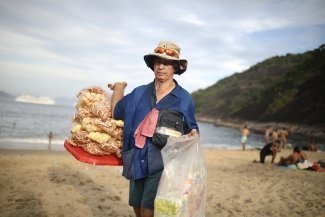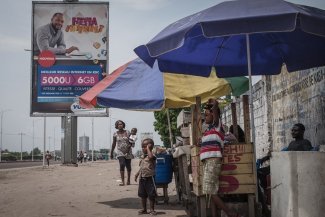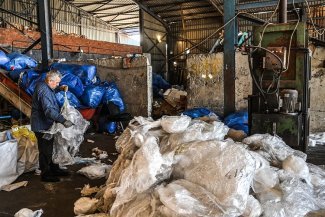A group of soldiers patrol in mid-2018 by a path in Mesetas, a jungle and mountainous area in south eastern Colombia. In regions like this, the FARC guerrillas who laid down their arms are waiting uncertainly for the decisions of the SJP and Iván Duque’s new government.
Uncertainty looms over Colombia, two and a half years after the signing of the historic peace accord. The political agenda has become polarised to the point of questioning one of the pillars on which the agreement with the FARC guerrillas was based. The Special Jurisdiction for Peace (SJP), the special tribunal that was created to judge war crimes, is at the centre of a debate between two conflicting views: for some it is synonymous with impunity, for others it is the path towards reconciliation.
The case of the man known as Jesús Santrich, a former leader of the now disbanded FARC guerrilla group, is symptomatic of the problems facing Colombia. His controversial journey since he put down his weapons says a lot about a country that took more than 50 years to put an end to its internal armed conflict and which is now struggling to take decisive steps towards its new future.
Santrich was supposed to take up one of the parliamentary seats reserved for the leaders of the FARC (now a political party) in line with what was agreed in the discussions in Havana. On 9 April 2018, however, he went to prison and stayed there for 13 months while being investigated for alleged drug trafficking offences after the signing of the peace accord and while it was being decided whether he should be extradited to the United States.
After his release, he was arrested again. Finally, the courts ruled that he should be released so that he could be tried for drug trafficking while enjoying parliamentary immunity. He finally took up his seat in the Chamber of Representatives on 11 June, despite the fact that President Iván Duque considers him “mafioso”.
In terms of the overall situation in Colombia, the important thing about this political soap opera, which changes daily, is not what will happen to him but what his story symbolises: the irreconcilable polarisation of a society divided since the referendum on the peace agreement held on 2 October 2016.
The SJP is the battlefield on which those who voted in favour of the peace agreement promoted by the then president Juan Manuel Santos find themselves in confrontation with the ’No’ voters, as represented by the Presidency, in the person of Ivan Duque after he won the elections in June 2018.
This court has played a leading role in the Santrich case, at odds with the country’s mainstream justice system, leading to the resignation of Attorney General Néstor Humberto Martínez, and the Minister of Justice, Gloria María Borrero, a political earthquake whose consequences are as yet unpredictable.
A unique experiment in the world
To understand the importance of the SJP in the consolidation of peace over the next few years in Colombia, it is necessary to look at the defining features of what was the longest conflict in the Western Hemisphere.
“In this complicated situation, after so many deaths, displacements and disappearances, the solution that the government and the guerrillas opted for was an agreement based on four points: reparation, truth, no repetition and justice. The SJP is the instrument which will steer this process,” sociologist Jorge Galindo explains to Equal Times.
Different international experts consider Colombia to be a unique experiment in the world in transitional justice, focused on accountability and reparation for victims, as the means of leaving the long period of conflict in the past, on the grounds that that the conventional justice system is not equipped for the task.
The key to this lies in the interpretation of the role of the SJP. For the Duque government, which represents the traditional right in Colombia in the form of Uribismo (his party, the Democratic Centre, led by former President Álvaro Uribe, was according to many analysts responsible for the victory of the group in the last elections), the SJP is synonymous with impunity. So much so, that the most radical sector of his party has dubbed it “the tribunal of the FARC.”
Emilio José Archila, a presidential adviser on post-conflict related issues, tells Equal Times: “Iván Duque has guaranteed the independence of the SJP at all times; he always emphasised that he would comply with the agreements, and this is exactly what he has been doing since he got to power.”
During the campaign, the president endorsed the phrase “no shredding, no mocking”, meaning that the peace agreement should not be destroyed but it was necessary to change some points. Among them was one of his obsessions, the SJP.
Since taking office, Duque has filed six objections to this body (to which he was entitled as president) that were rejected first by Congress (he did not have the necessary majority) and finally by the Constitutional Court.
“I accept the decision as a Colombian and as a defender of the law, but I will never stop defending the principles that have motivated the Colombian people, so that we may have peace with justice, a peace in which we all believe, and I will continue to do so every day of my life,” the president told the media.
“The Uribistas consider it inadmissible that the guerrilla leaders, whom they call criminal drug traffickers, should participate in politics. And they want to leave the door open for them to go to jail and even be extradited to the United States. All this would mean that the agreement that the FARC signed to lay down its arms was a hoax,” says Colombian academic Andrei Gómez, a research associate in memory and reconciliation at the University of Bristol.
On the other side of the argument are the associations of victims, human rights groups, social leaders and progressive political groups that believe that peace will only be possible if Colombian society is able to take on words such as forgiveness and reconciliation. And “give priority to the truth, to no repetition and to reparation in face of the demands for justice,” writes Galindo, the Colombia-based editor of the Politikon analysis group, for whom it is undeniable that “at least half of the country looks with scepticism at the work of the SJP”.
The victims’ right to the truth
The journalist Alberto Salcedo Ramos says that “the Colombian state never managed to defeat the FARC and that is why it was forced to negotiate an agreement with the guerrillas.” For that reason, he concludes, it cannot demand that leaders like the man known as Timochenko (the head of the former guerrilla group who has now taken up his seat in the Senate) be tried by the ordinary courts because these were not the conditions under which they handed over their guns.
The SJP statutes stipulate that as long as there is truth and recognition of the crimes committed, there will be no prison sentences. The detractors of the tribunal criticise the fact that state security forces (military and police) are given the same treatment as the guerrillas.
“That’s not the problem,” notes Gómez. “Many soldiers have publicly supported the SJP because they understand that it is a reasonable instrument to provide legal closure after decades of atrocities.”
Nearly 10,000 ex-guerrillas and 2,000 members of the armed forces have promised to testify before the SJP. These testimonies should not only serve to respond to the victims’ right to the truth, but also to heal wounds still open in Colombia. This is a case of false positives, as it is well known in the country that innocent civilians were killed at the hands of the army, who used to pass them off as guerrillas to reap the rewards.
A recent report in the New York Times warned of a return to irregular military practices coinciding with the arrival of President Duque.
In August 2018, citizens gathered in the street outside the SJP building in Bogotá during the hearing against 14 soldiers accused of participating in extrajudicial executions in Soacha, a town 30 kilometres from the capital populated by those displaced by the conflict and some of the country’s poorest citizens. The atmosphere at the doors of the courtroom (the press cannot enter the trials) was tense and emotional; the dignity of the victims contrasted with the gloomy attitude of the courts.
Despite the signing of the 2016 agreement, peace in Colombia is far from being achieved, and the same social leaders who demonstrate at the doors of the SJP in Bogota are being killed every day in regions where insecurity has returned. 2018 was the worst year in decades for human rights activists in the country and since the peace agreement was signed in 2016 there have been 366 murders, according to data from the group Somos Defensores.
Powerful enemies
On 7 August, Iván Duque will have been President of the Republic of Colombia for a year. Considered as being on the more moderate wing of his party, his term in office so far has been marked by an inability to move his agenda forward.
Criticism has come from both sides: the centre and left of the political and social spectrum are asking him to commit to consolidating the peace process in the regions; meanwhile, the more radical Uribistas are demanding that he does whatever it takes to change the points in the agreement relating to justice – that is, to the SJP.
“Leaving the Colombian justice system in suspense for 15 or 20 years is a very serious matter,” says Álvaro Uribe in an interview with the Colombian daily El Tiempo. Their party is urging Duque to look for alternative ways to change the points regarding the SJP that he did not manage to change by legal means. “They do not rule out the possibility of convening a Constituent Assembly, like Nicolás Maduro in Venezuela. Fortunately, so far Duque has said he will respect constitutionality,” says sociologist Galindo.
The Santrich case also serves to outline what the new government’s relationship with the Donald Trump administration in the United States will be like. The administration has not stopped pressuring Duque over the increase in illicit crops (in 2017 Colombia’s coca production reached record highs of 171,000 cultivated hectares) and is keeping a close eye on the decision about the extradition of Colombians accused of drug trafficking.
Meanwhile, the SJP has been involved in several incidents that have dented its public image. In March of this year the Colombian authorities detained the SJP prosecutor Carlos Julio Bermeo for accepting a bribe, with the aggravating circumstance that the purpose of said bribe was to help Santrich in his case.
The analyst Ariel Ávila, of the Peace and Reconciliation Foundation, commented that “a strategy calculated down to the last detail by some political sectors and some supposed cases of corruption have driven the SJP into a corner”.
“From the outset there were powerful enemies opposed to the creation of the SJP. The majority of them were within in the current party of government, the Democratic Centre. From there, they planned the strategy to destroy the transitional justice model. The first step was to get the ‘good faith third parties’ that is, the civilians who benefited from the war,” he wrote in his column for El País.
In this way, businessmen and politicians who may have collaborated with the paramilitaries during the government of Álvaro Uribe between 2002 and 2010 will be spared from testifying before the SJP, according to Gómez. “What some sectors of society fear is that testimony at the SJP trials end up smearing these civilian third parties.”
Distrust and international pressure
The enthusiasm with which the Colombia peace agreement was welcomed in the international community in 2016, when former President Juan Manuel Santos was awarded the Nobel Peace Prize, has been overshadowed by growing distrust among the international humanitarian aid agencies that work in the country. A communiqué from the United Nations in June called on the new government to “stop inciting violence against the demobilised members of the FARC.”
The response of some officials is decidedly lukewarm. “What we have to say to the United Nations is that they should show respect, that this is a decent government,” Uribe promptly replied, using his Twitter account and public appearances to influence not only the national debate but also the decisions of President Duque.
In May, 79 Democratic congressmen and women from the United States wrote to Secretary of State Mike Pompeo urging him to put pressure on Duque to implement the peace agreement. That same month an editorial in the New York Times, entitled Colombia’s Peace is Too Precious to Abandon, warned that "peace may be unravelling, which would be a disaster for the country, for the region and for the cause of democracy”.
Humberto de la Calle himself, who was the chief negotiator with the FARC on behalf of the Santos government, said in an interview in June with the Colombian newspaper El Tiempo that "peace is in danger" and gave a very critical analysis of the current situation in Colombia.
“It is a very fragile environment. There is too much fear. What have people got against the SJP? There are those who, out of rage, want to see the combatants in jail. But there are also those who believe that illegal state and paramilitary violence was necessary. While in the background there remains a lingering sense that the violence was a good thing, we will not be able to turn the page.”
At the same time that nagging doubts persist outside the country, in Colombia there is a growing sense of fear because the more than 10,000 guerrillas that laid down their arms are starting to take them up again. According to the independent organisation InSightCrime, the number of dissidents had reached 2,800 people by September of last year.
It is not a good sign that his number two, known as Iván Márquez, who was one of the architects of the peace agreement, is now reneging on it. “It was a serious mistake to have handed over the weapons to a cheating state,” he said on his Twitter account. For the time being his whereabouts are unknown and he has not appeared before the SJP. He says that with the current government there are no guarantees of security for the former guerrillas. The court proposes to issue an arrest warrant against him and he could lose his seat in the Senate.
“Despite this uncertainty, in two years the SJP will begin to deliver results if it is are allowed to continue working as it has until now,” says Gómez, who believes that for Colombian society these trials, where what happened during the war is being told for the first time, are the only way to overcome a conflict that has held generations in its grip.
There is a crucial date on the horizon for the consolidation (or not) of peace in Colombia: 27 October of this year, when the regional elections are held. It will be an opportunity for the areas that were hardest hit by the conflict to show through their vote what they think of the new conservative government.
Until then, Duque has two options: either he manages to build up a greater majority in Congress, betraying his mentor Uribe, or he commits to the implementation of the peace process in the regions, opting for investment in development projects. Failing that, he will be increasingly alone and the number of critics will grow,” says Galindo.
At stake is a faltering peace that took more than half a century to achieve. And there is the anguished wait of the victims who found themselves in the midst of a conflict between guerrillas, paramilitaries and armed forces of the state and who now for the first time might find out the truth of what happened to their husband, wife, parents or children who were killed.





